A Day in the Life of the Vietnam Bear Rescue Centre
10 July 2014
Caring for a sanctuary full of moon and sun bears is a multifaceted job that continues seven days a week, 365 days a year. Annemarie Weegenaar, Bear and Vet Team Director at Animals Asia’s Vietnam Bear Rescue Centre shares a day in the life of a bear rescue centre from a manager’s perspective in a diary extract from April 2014.
This morning at the Vietnam Bear Rescue Centre (VBRC) starts with a meeting at 8am between the bear managers and the team leaders of the five bear houses. All conversations are being translated by our skilled translators. Today is the start of the quarterly weighing. The bear team heads over to the bear houses, pulling wheelbarrows fully loaded with food. A variety of fruits and vegetables, and a small amount of dog food make up the bears’ daily diet. On top of that, enrichment food and toys are being offered to the bears as well, following a four-week calendar, with no two days being the same. The bear kitchen team starts the day at 7am to ensure all this is prepared in time.
Around 9am, when the team is ready to let the bears into their outdoor enclosures, I head over with apple, dried banana and a pot of yoghurt for the picky ones. The weigh cage is set up against a den. The bears not being weighed today are let outside and one by one the other 10 bears are moved into the den with the weigh cage. The door is opened, the bear enters the cage, and is rewarded for standing still whilst their weight is recorded. Once completed, the weights are entered into our electronic database. We see seasonal fluctuations in their weights, and as it is winter in northern Vietnam, the bears tend to be at their heaviest.
At 9am our vet and two nurses are preparing for a health check on Joey, one of the juveniles. Our bears are health checked under anaesthesia once every two years to ensure there are no health issues we have not picked up on visual inspections. During the next two hours or so his check includes taking blood, checking his abdomen with an ultrasound, and checking his teeth and eyes. Fortunately, Joey is in good health and he will be able to return to the cub house once he has recovered.
Tuan Bendixsen, our Vietnam director, is on site today. He is meeting with various departments regarding an event which will take place at the centre over the weekend. A group of supporters from Hanoi will ride their bicycles to our rescue centre in Tam Dao National Park to highlight the plight of the bears. This is such a great initiative and a true indication that people within Vietnam want to see an end to bear bile farming.
By lunchtime our staff all change out of their work uniforms and head to the front of the national park to have lunch served by the canteen. Most of our staff live in the local area and they head home for a brief rest.
At 2pm our bear team is back on site and they recall the bears inside the houses. During the cooler winter months some of our bears are less active and their appetites drop. This makes them slower to respond, but they are still inside within a few minutes after the bell. The team enters the enclosures to distribute food and enrichment. The bear team is scattering food around the enclosure to stimulate foraging behaviour. One bear worker skilfully climbs high up a play structure to fix a rope from a bamboo toy which a bear had chewed through. The horticultural team is cutting the grass underneath the electric fence; with the warmer weather the grass is now starting to grow rapidly.
One of the highlights of working with the bears is watching them run outside when the bell rings, looking for the tasty food. Luca is trying to get a pear from a large forage ball; he seems slightly wary of the white object and after circling it many times, he decides he can’t get to the pear and gives up. Luca has short legs and he will need to find food closer to the ground. Soon after, Taurus notices the pear and retrieves it with little effort. After the bears have finished their food there is lots of time to play. Lotus enjoys a good wrestle with Gus and Chocolate. Further along, Murko is having fun with Mema. It’s so great seeing our bears play after all they have gone through (play behaviour is a potential marker of general well-being in mammals that tends to disappear when welfare is poor). Most of our rescued bears have been kept on bear bile farms for many years, enduring countless bile extractions. They were housed in small barren cages in a completely non-stimulating environment. Their diet was poor; often just congee with perhaps some vegetables. All this leaves a huge mark, physically and psychologically. But, once at our sanctuary, they receive much needed medical care and then the recovery process can begin. They will no longer experience the pain and fear they endured on the bile farm. With time, a well balanced diet, being given access to a semi-natural enclosure and being integrated with other bears, the bears slowly put their past behind them and learn to be bears again.
At 3pm a construction meeting takes place; our project manager gives an update on the progress of the construction of two new double bear houses. This is a very exciting development as it means we have more space for our resident bears but it also enables us to rescue more bears still kept on bile farms throughout the country.
By 4:45pm our bears are recalled back inside the houses one final time. Today, they receive a mixture of sugar cane and dried sweet potato as a reward for responding to the bell. Some bears receive daily medication for various health problems and once offered, the team feeds the bears their last portion of dog food. A final enrichment treat is a banana leaf which the bears happily take into their baskets, many eating it, but a few using it as a nesting material. The lights go off at 6pm and all the bears will, for the most part, sleep throughout the night, until the bear team arrives again the following morning at 8am.
Every department at the VBRC is dedicated and hard working, all ensuring that the best possible care is provided to our rescued bears. With their continued support, we keep on getting closer to ending bear bile farming in Vietnam.
BACK
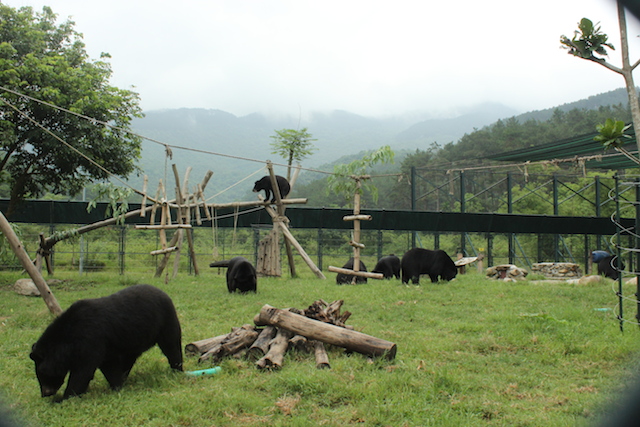
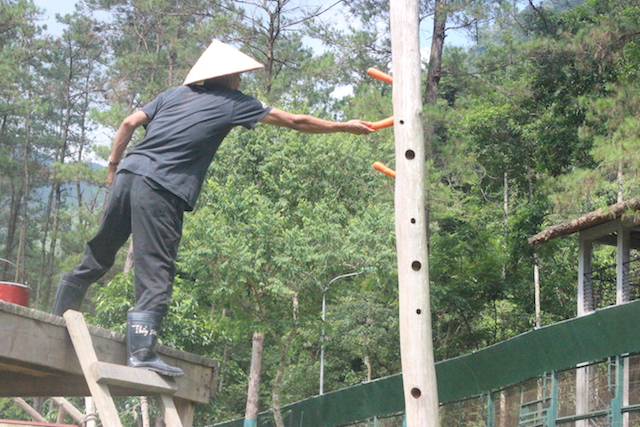
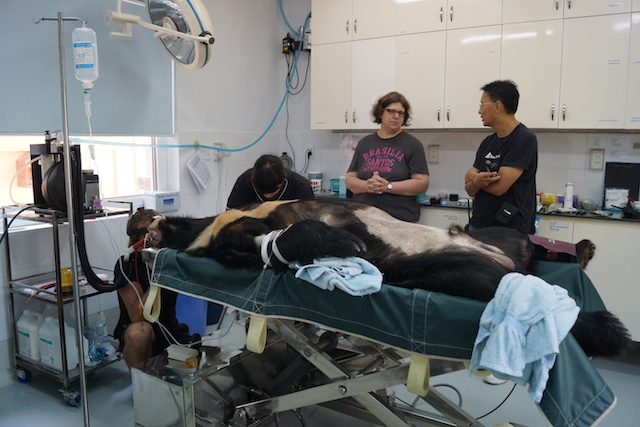
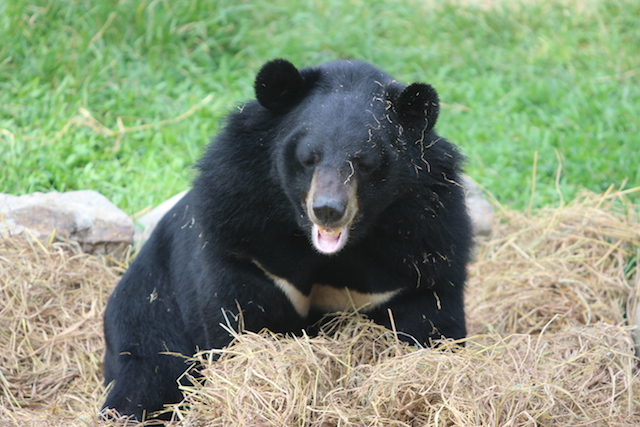
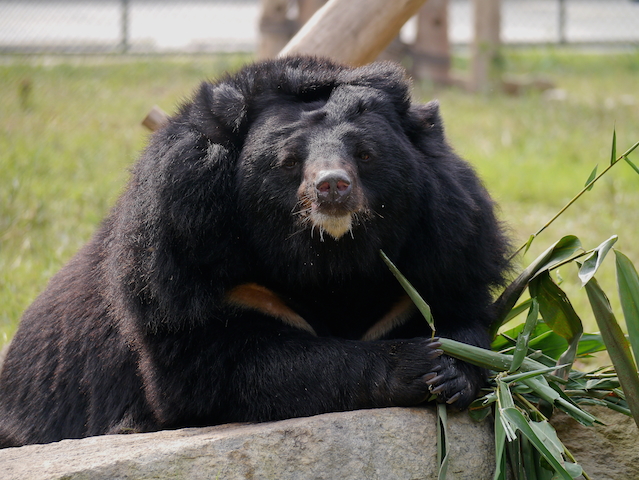
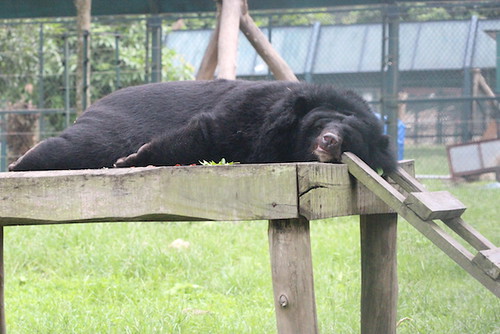




 Freedom after two decades: Moon bears Nang and Mua rescued
Freedom after two decades: Moon bears Nang and Mua rescued
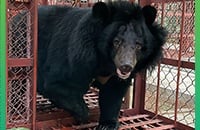 With heavy hearts we say goodbye to our beloved Tulip
With heavy hearts we say goodbye to our beloved Tulip
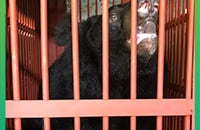 Three moon bears rescued from notorious bear bile farming hotspots in Vietnam
Three moon bears rescued from notorious bear bile farming hotspots in Vietnam